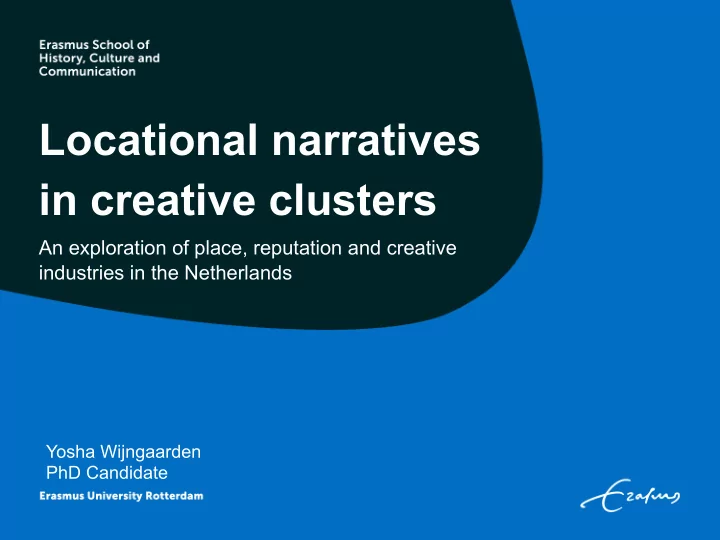

Locational narratives in creative clusters An exploration of place, reputation and creative industries in the Netherlands Yosha Wijngaarden PhD Candidate
Clusters?
Clusters?
Creative clusters?
Why do creative entrepreneurs locate in clusters? • ‘Buzz’ (Storper & Venables, 2004), noise (Grabher, 2002) and face- to-face contact (Scott, 1998, 2004; Gordon and McCann, 2000; Pratt 2000; Banks et al., 2002) • Knowledge spillovers (Malmberg et al., 2005); • Social networks (e.g. Comunian, 2011; Grabher, 2004); • A places’ rugged look and grittiness (Heebels & van Aalst, 2010; Lloyd, 2002; Smit, 2011), • Generating identity and inspiration (Helbrecht, 1998)
Context: the CICI project • The Cultures of Innovation in the Creative Industries project • 10 small-scale clusters in the Netherlands • 10 in-depth interviews with managers • 30 short interviews with creative entrepreneurs/artists • 37 in-depth interviews with creative entrepreneurs/artists
Place and creative entrepreneurship: locational narratives • Creative production: symbols and narratives (e.g. Lash & Urry, 1994) • Reputation is important for Past Place creative entrepreneurs/artists (Currid, 2007) Something else Locational narrative
Locational narratives
Attracting creative entrepreneurs • As many of my interviewees pointed out, part of the lure of New York City is its global tastemaker status, making cultural producers wish to be associated with the New York brand. This is no small observation. It is not enough that a city or region possesses a cultural agglomeration; cultural producers must want its brand affiliated with their own creativity and cultural goods. Planners and economic developers can play an active role in cultivating such a reputation for places, so they will attract talented people “(Currid, 2007, p. 464)
Reputation • What other stakeholders think of the organisation/place, not what the cluster managers etc try to develop (this is image) (Brown et al., 2006)
Discussion and further research • Dissertation • Innovation • Informal contacts • Industrial heritage
Recommend
More recommend